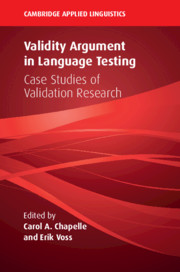Book contents
- Validity Argument in Language Testing
- The Cambridge Applied Linguistics Series
- Validity Argument in Language Testing
- Copyright page
- Contents
- Figures
- Tables
- Contributors
- Series Editor’s Preface
- 1 Introduction to Validity Argument in Language Testing and Assessment
- Part I Basic Concepts and Uses of Validity Argument in Language Testing and Assessment
- Part II Investigating Score Interpretations
- 4 Domain Definition Inference for a Virtual Interactive Aviation English Test (VIAET) for Military Air Traffic Controllers
- 5 Support for the Evaluation Inference
- 6 Generalization Inference for a Computer-Mediated Graphic-Prompt Writing Test for ESL Placement
- 7 The Telephone Standard Speaking Test
- 8 The Explanation Inference for a Test of Academic English Collocational Ability
- 9 Extrapolation of the Meaning of Grades on Writing Tasks in an ESL Writing Class to Success on Tasks in University Courses
- Part III Investigating Score Uses and Consequences
- Part IV Conclusion
- Index
- References
5 - Support for the Evaluation Inference
Investigating Conditions for Rating Responses on a Test of Academic Oral Language
from Part II - Investigating Score Interpretations
Published online by Cambridge University Press: 14 January 2021
- Validity Argument in Language Testing
- The Cambridge Applied Linguistics Series
- Validity Argument in Language Testing
- Copyright page
- Contents
- Figures
- Tables
- Contributors
- Series Editor’s Preface
- 1 Introduction to Validity Argument in Language Testing and Assessment
- Part I Basic Concepts and Uses of Validity Argument in Language Testing and Assessment
- Part II Investigating Score Interpretations
- 4 Domain Definition Inference for a Virtual Interactive Aviation English Test (VIAET) for Military Air Traffic Controllers
- 5 Support for the Evaluation Inference
- 6 Generalization Inference for a Computer-Mediated Graphic-Prompt Writing Test for ESL Placement
- 7 The Telephone Standard Speaking Test
- 8 The Explanation Inference for a Test of Academic English Collocational Ability
- 9 Extrapolation of the Meaning of Grades on Writing Tasks in an ESL Writing Class to Success on Tasks in University Courses
- Part III Investigating Score Uses and Consequences
- Part IV Conclusion
- Index
- References
Summary
This chapter reports on one aspect of the argument-based validation research conducted to evaluate the interpretation and use of scores from the Oral English Certification Test (OECT). The test of English speaking ability for prospective international teaching assistants (ITAs) was updated by introducing a new a web-based rating system, called Rater-Platform (R-PLAT). R-PLAT was intended to improve the efficiency of the rating process, but research was needed to investigate its effects on all aspects of the interpretation/use argument (Kane, 2013). The study investigated the warrant underlying the evaluation inference: the observed performance on the OECT recorded via R-PLAT provides observed scores and observed performance descriptors reflective of targeted speaking ability. The assumption in need of support was that the quality of rating conditions created by R-PLAT was sufficient for gathering accurate scores. Backing was found through analysis of raters’ perceptions towards and their use of R-PLAT collected through questionnaires and interviews. This chapter concludes with the validity argument showing how evidence collected from this study supported the assumptions underlying the evaluation inference. It suggests future research needed to build the complete validity argument for the OECT with R-PLAT, and potential use of a web-based rating system for other speaking tests.
Keywords
- Type
- Chapter
- Information
- Validity Argument in Language TestingCase Studies of Validation Research, pp. 96 - 119Publisher: Cambridge University PressPrint publication year: 2021

